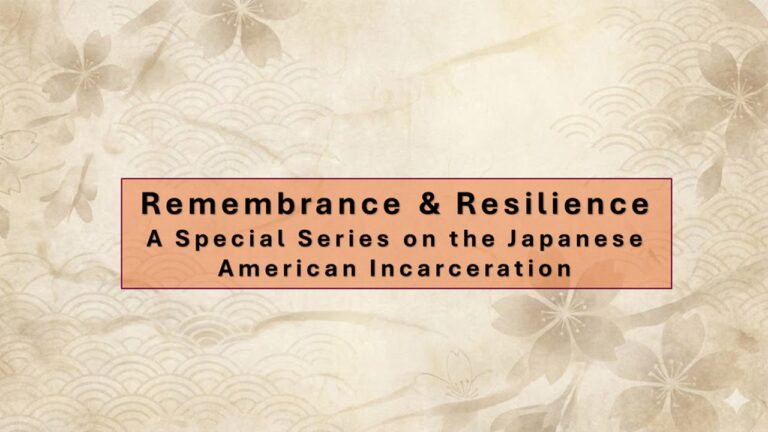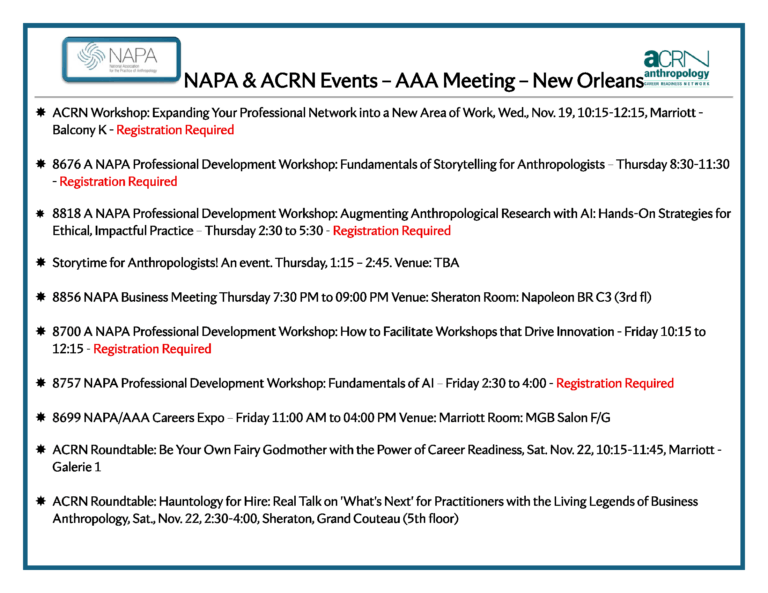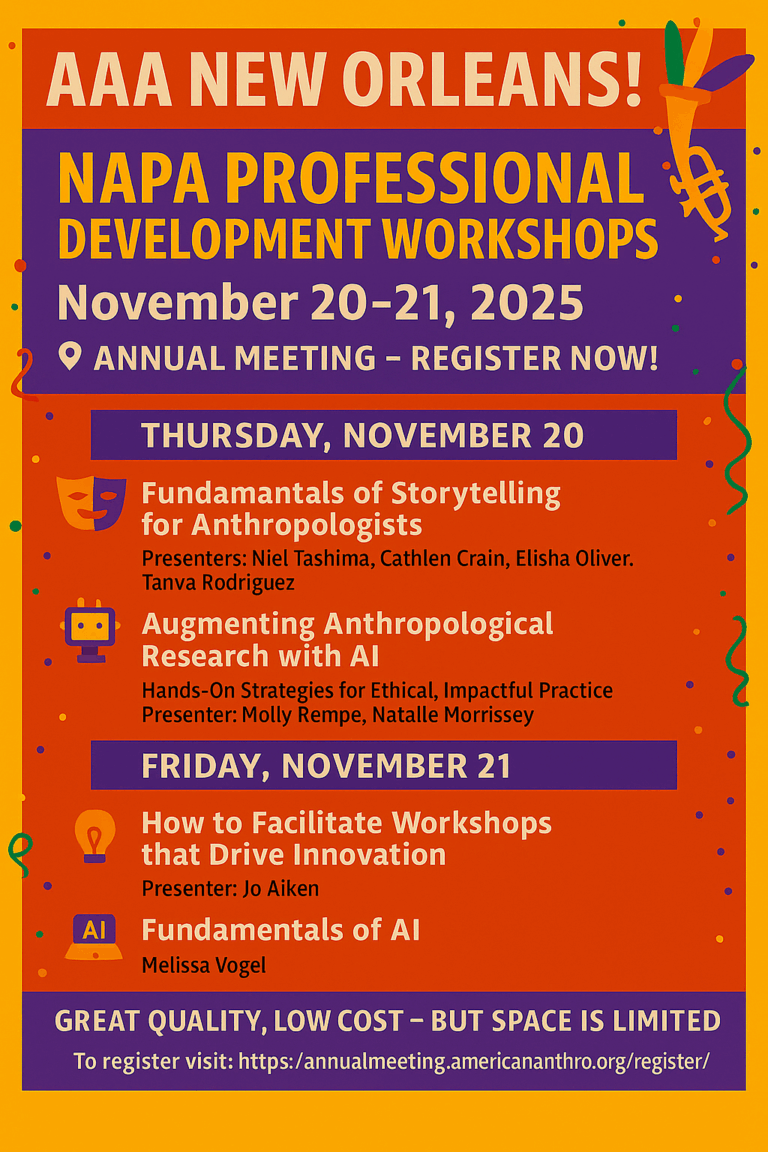National Association for the Practice of Anthropology
NAPA Workshops 2017
More information about all workshops and registration can be found on the AAA website at
http://www.americananthro.org/AttendEvents/Content.aspx?ItemNumber=2294
Please verify all room locations on site.
- Byadmin
- On
Wednesday, November 29
1:00-5:00 pm
(2-0260) ANTHROPOLOGICAL ENTREPRENEURSHIP: CONTRADICTION OR REALITY?
Terry Redding and Ben Blount
$20 students / $40 professional
Workshop Track(s): Practicing / Applied Career Development
Location: Marriott, Park Tower 8212
Can anthropologists survive, even thrive, in independent business as contractors, consultants, or entrepreneurs? Of course they can, and there are many good role models from whom to learn. This workshop will first review some basics of going it alone as an independent consultant or setting up a small contracting business to serve private and/or public sector markets. The workshop will then feature Q&A with a panel of anthropologists who are working on their own or who have set up their own small businesses.
This workshop should be of benefit to anyone seeking to strike out on their own with anthropological entrepreneurship as the foundation. Some of the anticipated topics to be outlined include: The business of the business (license, office set up); LLC vs independent (liability, taxes, deductions, banking); Finding and retaining clients, and basic marketing; Setting rates; Billing and accounting.
1:00-5:00 pm
(2-0265) DESIGN ANTHROPOLOGY: ETHNOGRAPHIC APPROACHES TO INNOVATION
Emilie Hitch and Tamara Hale
$20 students / $40 professional
Workshop Track(s): Practicing / Applied Career Development
Location: Marriott, Park Tower 8216
For the anthropologist, learning about the tools and methods designers use can help them to re-frame their projects and provide fresh insights and “ways in” to better empathizing with and understanding both their research subjects and the designers that they may find themselves working alongside in many organizations. This workshop will introduce Human-Centered Design (HCD) as a way to experiment with the processes and tools of teams of people who practice this methodology around the world. Practical activities will range from visualizations (i.e., mind-mapping, story boards, white boarding and framework creation) to data organization with post-its, reduction activities in group discussions and “World Café’s,” and various methods of prototyping. This workshop will also include an exercise in which we will explore a challenging environment with considerable design constraints and apply Human-Centered Design models as pioneered by IDEO and International Development Enterprise’s innovation and impact lab, and the iterative “L.I.V.E.” method used by Rabbit.
Thursday, November 30
10:30 am-12:30 pm
(3-0510) INNOVATING QUALITATIVE RESEARCH THROUGH FILMED ETHNOGRAPHY
Bruno Moynié
Workshop Pricing: $10 students / $20 professional
Workshop Track(s): Academic Career Development, Practicing / Applied Career Development, Technical Skill Development
Location: Marriott, Park Tower 8218
Come participate in a workshop where an ethnographer/filmmaker will share his field experience (and occasional frustration!) of trying to implement an ethnographic approach using film in design and marketing research. Don’t be afraid of another PowerPoint presentation here. This workshop is a mix of free-style passionate storytelling about professional experiences using as many clips of films as possible, while engaging attendees in discussions about the finer points of ensuring technical quality, business culture acumen, and client negotiation. The workshop illustrates a particular approach to ethnographic filmmaking including securing the contract, working as a member of a team, establishing rapport and conducting initial observations, filming through all phases of the research, applying a method to edit field sequences, and delivering thematic edits or a presentational video to the client.
Friday, December 1
10:30 am-12:30 pm
(4-0525) CHARTING YOUR COURSE: DEVELOPING A PERSONAL STRATEGIC PLAN
Melissa Vogel
$10 students / $20 professional
Workshop Track(s): Academic Career Development, Practicing / Applied Career Development
Location: Marriott, Park Tower 8212
As higher education administration continues to be heavily influenced by business practices, and employment opportunities for anthropologists are more often found in the private sector, it is essential that individual anthropologists start thinking more strategically about their career paths and how they intersect with their own personal and professional goals. Graduate programs often expose students to only one, narrowly defined path that nearly always leads to a tenured faculty position at a research university, yet few will actually reach this goal and many more may not want to. This workshop is designed to help you identify your short and long-term goals and create a step-by- step plan on how to achieve those goals. Participants will also be encouraged to explore a wide range of career possibilities and to incorporate their concerns for work-life balance and job satisfaction.
1:00-5:00 pm
(4-0755) CONSULTING IN ORGANIZATIONAL-CULTURE CHANGE
Elizabeth Briody, Ken Erickson, Keith Kellersohn, and Jo Aiken
$20 students / $40 professional
Workshop Track(s): Academic Career Development, Practicing / Applied Career Development
Location: Marriott, Park Tower 8210
The workshop is designed to help you discover whether a consulting career – with business, non-profits, government, or NGOs – may be in your future. First, we talk about “consulting basics” – who to approach, what to do and/or say, how to build and sustain client relationships, when to follow up, and why perseverance, compassion, and your own anthropological approach(es) matter. Second, we explore how client problems can connect with helpful anthropological methods and theory and become the basis for a consulting project. Examples are chosen from a variety of industries. Third, we examine the range of ways in which clients may work alongside us as partners and how data collection and analysis methods are adapted to suit shifting project foci. We discuss how to communicate emerging results, enhance shared understanding, and guide clients toward beneficial action. Fourth, we discuss how to work effectively with clients to assist them in addressing the often beneath-the- surface issues they face.
1:00-5:00 pm
(4-0765) PRODUCTION AND CONSUMPTION OF ADVERTISING
Maryann McCabe and Timothy Malefyt
$20 students / $40 professional
Workshop Track(s): Academic Career Development, Practicing / Applied Career Development
Location: Marriott, Park Tower 8216
Production and consumption of advertising is an interactive process in which advertisers and consumers learn from each other and respond to cultural ideas presented in the public sphere. At the heart of the process is ethnographic research on consumer practices, which provides insight into the meaning and use of products and services in everyday life. Findings from this research are incorporated into the creative and political process of developing advertising campaigns. This workshop will engage participants in the anthropology of doing consumer research, designing advertising messages and producing culture. Through simulated situations, participants will work in teams to solve client problems and take a critical approach to assessing culturally mediated messages.
Saturday, December 2
8:00-10:00 am
(5-0245) WORKPLACE ANTHROPOLOGY
Jan English-Lueck (Co-sponsored by SAW)
$10 students / $20 professional
Workshop Track(s): Academic Career Development, Practicing / Applied Career Development
Location: Marriott, Park Tower 8212
As people increasingly spend their waking hours at workplaces, anthropologists need to understand those experiences. Our practitioners need to develop distinct skills to access, document, analyze and relate the lives of workers and the businesses that employ them. We can study workplaces to learn about the lives of people who work in businesses, both as academics outsiders and embedded practitioners. Businesses employ anthropologists to understand a variety of worker-related issues within their own organizations. This workshop will consider the practical, theoretical and ethical issues that must be resolved to do workplace anthropology.
8:00 am-12:00 pm
(5-0270) GETTING A JOB AS A MASTER’S LEVEL ANTHROPOLOGIST
Terry Redding, Carol Ellick, and Tom Greaves
$20 students / $40 professional
Workshop Track(s): Practicing / Applied Career Development
Location: Marriott, Park Tower 8210
Those holding an anthropology Master’s degree with a non-specialized focus often have myriad possibilities but few clear directions about where to work and what job title to assume. This workshop will first present research-based findings on where MAs work and what they do. We will then discuss how to narrow your choices, job-seeking strategies, and how to best present yourself to an employer. A participatory exercise in seeking out and submitting a cover letter and resume to an employer of interest will follow. The final portion of the workshop will be a Q&A session.
Participants should bring a wifi-enabled laptop, current resume, and generic cover letter. This workshop will be of most benefit to MA-level students and recent graduates, but PhDs are welcome.
1:00-3:00 pm
(5-0695) REIMAGINING THE CUSTOMER: AN ANTHROPOLOGICAL FRAMEWORK FOR INNOVATION IN BUSINESS AND SOCIAL ENTERPRISE
Mike Youngblood and Ben Chesluk
$10 students / $20 professional
Workshop Track(s): Academic Career Development, Practicing / Applied Career Development
Location: Marriott, Park Tower 8217
In this workshop, we take a step back from familiar approaches to “customer ethnography” and move beyond simple subject-object conceptualizations of “the customer” that predominate in current approaches to business strategy and innovation, and will instead explore broader frameworks, informed by social theory and supported by ethnographic insight, for thinking about human engagement with the outputs and effects of business. Workshop participants will take a “complex human ecosystem” approach to the customers and populations engaged by business and apply a new typology of customer experiences—including non-direct types of experiences such as “ambient,” “associate,” “intermediary,” and “proxy” experiences. Working together in small groups, participants will explore how this expanded perspective can help businesses or social enterprises reimagine both their customers and their offerings—with particular emphasis on understanding and reaching out to individuals and populations that are overlooked, underserved, or fully disenfranchised by existing products and services. The workshop presenters will share examples from their own work in healthcare, urban planning, education, and other fields to bring the ecosystem perspective and experiential typology to life. Together, we will develop new ways for anthropologists to consult with business and social enterprise to imagine more beneficial outcomes for customers and society.
For details about registering for these and other workshops, see the AAA website at
http://www.americananthro.org/AttendEvents/Content.aspx?ItemNumber=2294



